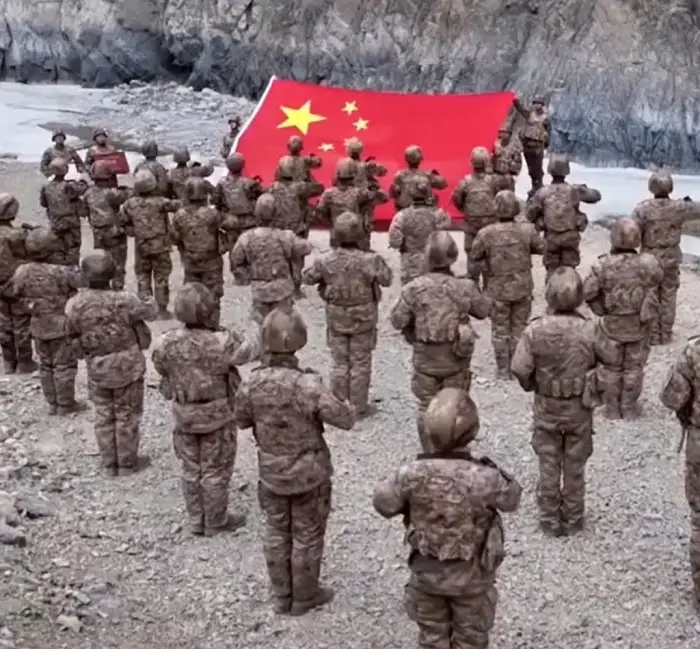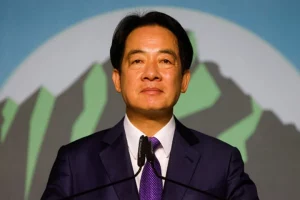China's Galwan propaganda has been exposed once again after a startling revelation that a video showing the unfurling of the national flag by the People's Liberation Army (PLA) soldiers in Ladakh's Galwan Valley on January 1 was in fact shot deep inside its territory, using local actors.
The Chinese social media is abuzz about the fake video, which was staged by professional actors, leaving the ruling CCP completely red-faced.
Users of Chinese microblogging website Weibo said that the CCP used Chinese film and television actor Wu Jing and his actress wife Xie Nan to "dramatically create" the flag raising ceremony.
The location also was not Galwan, the site of major unarmed clash between India and PLA troops on June 15, 2020. In fact, the "set" was created nearly 28 Kms behind Galwan river and inside the Chinese controlled area of Aksai Chin.
Wu Jing is well-known actor in China. He has starred in many hits, also playing the role of a Chinese soldier on a number of occasions, including in 'The Battle at Lake Changjin' – the 2021 epic war movie commissioned by the Chinese government. It is China's most expensive film to date released on the 100th Anniversary of Chinese Communist Party.
Xie Nan has also featured in movies like 'The Day We Lit Up the Sky', 'A Chinese Odyssey Part Three' and as a host of several popular shows, including 'Entertainment Live' and 'Happy Martial Arts'.
"According to weibo users, a team of directors and junior actors arrived at the shooting spot along with Wu Jing, Xie Nan and some PLA officers on 24 December to enact a flag ceremony at Galwan. The shooting took four hours to complete and the video was released as an event that occurred on January 1. Shortly after the names of actors were revealed by the Weibo users, all of their accounts were suspended," said a report.
Publicising the video, the CCP mouthpiece Global Times laughably said that the PLA soldiers who "never yield an inch of land" have sent their new year greetings to the Chinese people from the Galwan Valley near the border with India.
The Chinese media said that the national flag is "very special" since it once flew over Tiananmen Square in Beijing.
China’s national flag rise over Galwan Valley on the New Year Day of 2022.
This national flag is very special since it once flew over Tiananmen Square in Beijing. pic.twitter.com/fBzN0I4mCi
— Shen Shiwei沈诗伟 (@shen_shiwei) January 1, 2022
Unlike Beijing, New Delhi released genuine photographs and videos of Indian Army troops holding a large tri-colour at the Galwan Valley in eastern Ladakh as part of the New Year celebration
"Brave Indian Army soldiers in Galwan Valley on the occasion of #NewYear2022," tweeted Law minister Kiren Rijiju, who hails from Arunachal Pradesh.

India's Ministry of External Affairs (MEA) has already rubbished the Chinese claims as "not factually correct".
Separately, regarding India's reaction on the satellite imagery that showed illegal construction of bridge over Pangong lake by China, the MEA has said that New Delhi has been monitoring the activity closely.
"This bridge is being constructed in areas that have been under the illegal occupation by China for around 60 years now. As you're well aware, India has never accepted such illegal occupation. Separately, Government has been taking all necessary steps to ensure that our security interests are fully protected," said MEA spokesperson Arindam Bagchi during a regular media briefing on Thursday.
The Indian government also remains committed to increasing significantly the budget for development of border infrastructure and has completed more roads and bridges than ever before in the last seven years, thus providing much-needed connectivity to the local population as well as logistical support to the armed forces.
New Delhi also termed Beijing's recent exercise of renaming some places in Arunachal Pradesh as "ridiculous" as it supports untenable territorial claims.
"Calling Tuting as DouDeng or River Siyom as XiYueMu or even Kibithu as Daba does not alter the fact that Arunachal Pradesh has always been and will always remain an inalienable part of India. We hope that instead of engaging in such antics, China will work constructively with us to resolve the outstanding friction points in areas along the Western Sector of the Line of Actual Control in India-China border areas," added the MEA spokesperson yesterday.
Also Read: India to China – Inventing names to places in Arunachal Pradesh won't change the reality




















